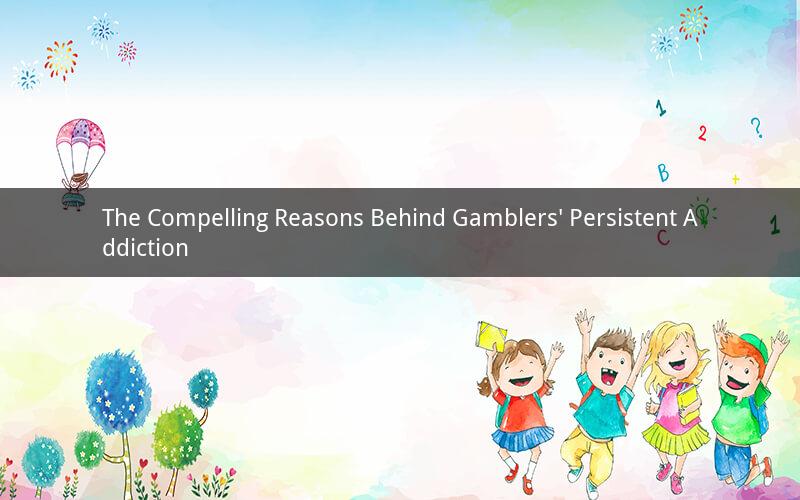
Gambling has been a topic of interest and debate for centuries. It is a form of entertainment that has the potential to be both thrilling and dangerous. One of the most intriguing questions surrounding gambling is why do gamblers keep gambling despite the risks and potential consequences? This article delves into the psychological, social, and economic factors that contribute to this persistent addiction.
1. The Thrill of Risk and Reward
One of the primary reasons why gamblers keep gambling is the thrill of risk and reward. The prospect of winning a substantial amount of money can be incredibly enticing, especially when it is accompanied by the adrenaline rush of taking a chance. This thrill can be addictive, as gamblers often seek out new and more challenging games to satisfy their desire for excitement.
2. The Psychological Effects of Gambling
Gambling can have a profound impact on an individual's psychology. The act of gambling releases dopamine, a neurotransmitter associated with pleasure and reward. This can create a sense of euphoria and well-being, which can be difficult to resist. Over time, this can lead to a psychological dependence on gambling, as individuals become more and more focused on the act of gambling itself rather than the potential rewards.
3. The Social Aspect of Gambling
Gambling is often a social activity, and the social aspect can play a significant role in maintaining a person's addiction. Many gamblers enjoy the camaraderie and excitement that comes with playing games with others. This social interaction can reinforce the behavior and make it more difficult to quit. Additionally, the desire to impress others or to be part of a group can also contribute to the continuation of gambling habits.
4. The Economic Incentives of Gambling
The economic incentives of gambling are another driving force behind the persistence of this addiction. For some gamblers, the potential to win a large sum of money is a powerful motivator. This can lead to a cycle of chasing losses, as gamblers try to recoup their previous losses and ultimately end up losing even more. The allure of wealth can be difficult to resist, especially when it is presented as a realistic possibility.
5. The Lack of Awareness of the Consequences
Many gamblers are not fully aware of the consequences of their actions. They may downplay the risks or believe that they can control their gambling behavior. This lack of awareness can lead to a continued pattern of gambling, as individuals are not fully motivated to change their habits. Additionally, the temporary relief from stress or anxiety that gambling can provide can make it even more difficult to break the cycle.
Q1: How can the psychological effects of gambling be managed or mitigated?
A1: Managing the psychological effects of gambling involves recognizing the signs of addiction and seeking professional help. Therapy, support groups, and self-help strategies can all be effective in addressing the psychological aspects of gambling addiction.
Q2: What role does social support play in the recovery process?
A2: Social support is crucial in the recovery process. Friends, family, and support groups can provide encouragement, accountability, and a sense of community. It is important for individuals to surround themselves with people who understand and support their journey towards recovery.
Q3: How can the economic incentives of gambling be addressed to reduce addiction?
A3: Addressing the economic incentives of gambling involves implementing regulations and restrictions on gambling activities. This can include setting limits on stakes, implementing mandatory cooling-off periods, and promoting responsible gambling practices.
Q4: What are some effective strategies for breaking the cycle of chasing losses?
A4: Breaking the cycle of chasing losses requires discipline and self-control. Setting a budget, taking regular breaks from gambling, and avoiding high-risk games can all be effective strategies. It is also important to seek professional help and develop coping mechanisms for dealing with stress and anxiety.
Q5: How can society as a whole work to prevent gambling addiction?
A5: Preventing gambling addiction requires a multifaceted approach. This includes raising awareness about the risks of gambling, implementing regulations and restrictions on gambling activities, providing support and resources for individuals struggling with addiction, and promoting responsible gambling practices. Education and outreach programs can also help to inform the public about the potential dangers of gambling.